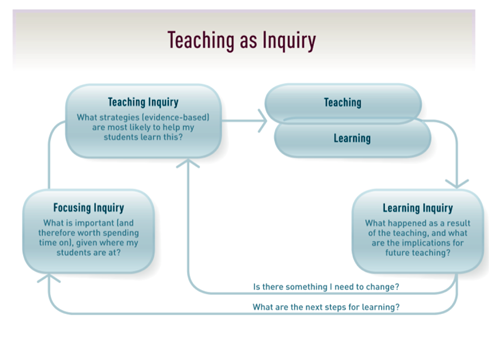Teaching as inquiry
Teaching as Inquiry is a model of the teaching process, designed to help teachers plan and implement student-centred teaching and learning. In this cyclical model, the teacher first determines the direction for learning, then decides which strategies and resources to use, puts these into action, and investigates the effectiveness of teaching.
This diagram from The New Zealand Curriculum depicts this process:

Teaching as inquiry diagram
If you cannot view or read this diagram, select this link to open a text version.
The focusing inquiry
The focusing inquiry establishes the baseline and the direction of the learning. Inquiries can be short-term (for example, evaluation of one aspect of a lesson or an evaluation focusing on one student), medium-term (for example, evaluation of a unit of work) or long-term (for example, evaluating the effectiveness of a year-long theme study).
For example:
- At the beginning of a level 6 poetry unit, find out which aspects of analysis the students find most challenging. Identify a group of students who have difficulty in one area and investigate possible techniques to try with them. Which strands, processes, and strategies should be the focus for learning?
- Listening to her level 7 class and reading their analyses, it was clear to the teacher that her students had limited understanding of the social and historical context of The Great Gatsby. So she researched possible ways of engaging them with the context.
- Following their work in a previous unit, the teacher realised her level 7 students were struggling to understand and analyse how text conventions work together to create meaning and effect. She decided to refocus on improving essential writing skills.
Instead of determining the goals yourself, co-construct goals for a programme or unit with your students (or, as HoD, with your department or faculty).
TOP
The teaching inquiry
The teaching inquiry involves asking what strategies will be most likely to help your students learn, and what outcomes you expect.
As part of this inquiry you could, for example:
- Reflect on past practice. What happened the last time you taught this?
- Discuss approaches with experienced colleagues and your HoD, RTLBs, and learning support staff. Ask the students how they best learn, and give them some say in the matter (for example, they may work best in groups).
- Talk to the teacher who took this class the previous year. You could do this over a coffee at interval.
Other sources of support
TOP
The learning inquiry
The learning inquiry examines what happened as a result of the teaching and considers what the implications are for future learning. A variety of measures can be used to evaluate the outcomes.
Ask your students to describe their next learning steps in their e-portfolio, journal, or learning log.
TOP
What should I do next?
You could, for example:
- Encourage your students to discuss their learning with their families. Conference with them, comment on their blog.
- Keep your own reflective journal in which you comment on levels of interest, engagement, enjoyment of the selected text, task, activities, nature and quality of responses. Arrange for a lesson observation by your HoD or a peer.
- Use student attendance data to see if there are patterns that need investigation and possible action.
- Identify particular weaknesses in student work and plan to address these in the next unit.
- Identify particular strengths in student work and plan to develop these further in future.
- Evaluate how effective the design of the programme was (for example, would a different sequence be better?).
TOP
A sample inquiry: Text study
This example suggests how you might apply Teaching as Inquiry to the selection of a text or texts for whole-class study.
1. The focusing inquiry
- What text(s) will engage my students? What factors should I be taking into account … culture, reading skills, interests, gender, etc?
- Given where my students are at in the curriculum, what levels and achievement objectives should I focus on?
2. The teacher inquiry
- What do my students need to know if they are to engage with this text?
- What resources are available to support their understanding?
- What teaching/metacognitive strategies should I use to help my students understand this text?
- What do I most want my students to take away from their study of this text?
3. The learning inquiry
- In terms of learning/achievement objectives, what did my students learn from this study?
- Did they use a variety of processes and strategies in their text study?
- How effective were their strategies? How do I know their text analysis skills are developing?
- What other texts could I use to extend this group?
Last updated June 11, 2024
TOP


